英语中的副词
副词英语词汇大全
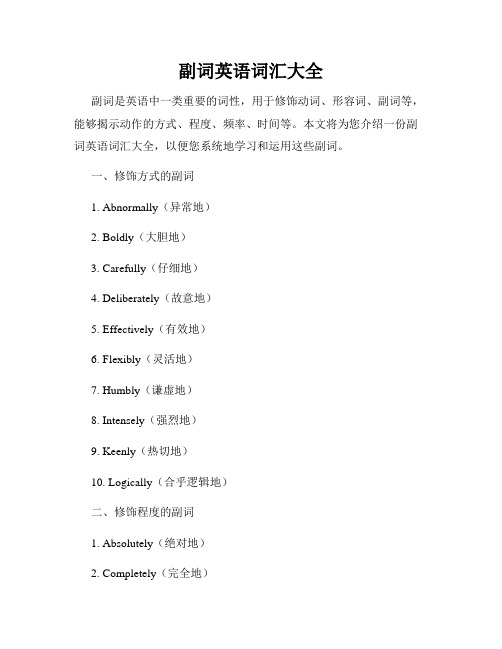
副词英语词汇大全副词是英语中一类重要的词性,用于修饰动词、形容词、副词等,能够揭示动作的方式、程度、频率、时间等。
本文将为您介绍一份副词英语词汇大全,以便您系统地学习和运用这些副词。
一、修饰方式的副词1. Abnormally(异常地)2. Boldly(大胆地)3. Carefully(仔细地)4. Deliberately(故意地)5. Effectively(有效地)6. Flexibly(灵活地)7. Humbly(谦虚地)8. Intensely(强烈地)9. Keenly(热切地)10. Logically(合乎逻辑地)二、修饰程度的副词1. Absolutely(绝对地)2. Completely(完全地)3. Extensively(广泛地)4. Incredibly(难以置信地)5. Only(仅仅)6. Quite(相当)7. Remarkably(非常)8. Slightly(稍微)9. Utterly(彻底地)10. Very(非常)三、修饰频率的副词1. Annually(每年)2. Daily(每天)3. Frequently(频繁地)4. Hourly(每小时)5. Monthly(每月)6. Occasionally(偶尔)7. Regularly(定期地)8. Seldom(很少)9. Weekly(每周)10. Yearly(每年)四、修饰时间的副词1. Afterwards(之后)2. Before(之前)3. Currently(目前)4. During(期间)5. Eventually(最终)6. Formerly(从前)7. Instantly(立刻)8. Now(现在)9. Recently(最近)10. Soon(很快)五、修饰程度和方式的副词1. Carelessly(粗心地)2. Completely(完全地)3. Honestly(真诚地)4. Properly(适当地)5. Quickly(快速地)6. Seriously(认真地)7. Smoothly(顺利地)8. Steadily(稳定地)9. Surely(确实地)10. Well(好)六、修饰地点的副词1. Above(在上方)2. Below(在下方)3. Here(这里)4. Locally(本地地)5. Nearby(附近)6. Overseas(在国外)7. There(那里)8. Underneath(在下面)9. Upstairs(在楼上)10. Within(在内部)七、修饰表情和说话的副词1. Angrily(生气地)2. Sadly(悲伤地)3. Happily(快乐地)4. Softly(轻声地)5. Loudly(大声地)6. Nervously(紧张地)7. Quietly(安静地)8. Proudly(自豪地)9. Surprisingly(令人惊讶地)10. Happily(愉快地)八、修饰数量的副词1. Almost(几乎)2. Barely(勉强)3. Entirely(完全)4. Fully(完全)5. Hardly(几乎不)6. Mostly(大多数情况下)7. Nearly(几乎)8. Partly(部分地)9. Scarcely(几乎不)10. Wholly(完全)九、修饰推测的副词1. Apparently(显然)2. Certainly(肯定)3. Possibly(可能)4. Likely(可能)5. Maybe(或许)6. Presumably(大概)7. Surely(肯定)8. Perhaps(或许)9. Probably(可能)10. Undoubtedly(无疑地)以上是一份副词英语词汇大全,其中包含了各类副词及其常见用法。
英文副词例子
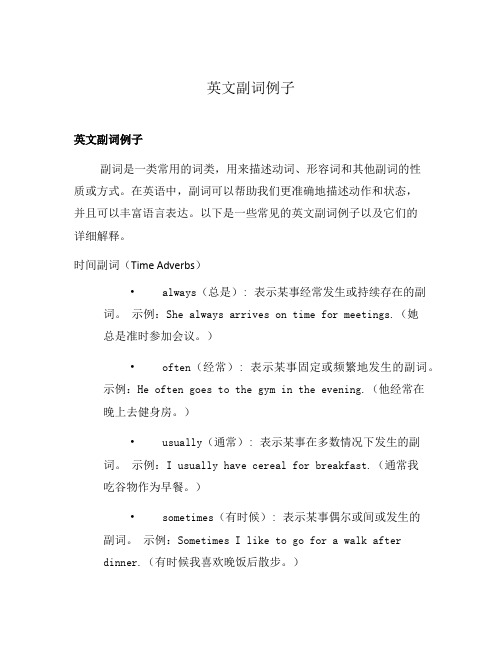
英文副词例子英文副词例子副词是一类常用的词类,用来描述动词、形容词和其他副词的性质或方式。
在英语中,副词可以帮助我们更准确地描述动作和状态,并且可以丰富语言表达。
以下是一些常见的英文副词例子以及它们的详细解释。
时间副词(Time Adverbs)•always(总是): 表示某事经常发生或持续存在的副词。
示例:She always arrives on time for meetings.(她总是准时参加会议。
)•often(经常): 表示某事固定或频繁地发生的副词。
示例:He often goes to the gym in the evening.(他经常在晚上去健身房。
)•usually(通常): 表示某事在多数情况下发生的副词。
示例:I usually have cereal for breakfast.(通常我吃谷物作为早餐。
)•sometimes(有时候): 表示某事偶尔或间或发生的副词。
示例:Sometimes I like to go for a walk afterdinner.(有时候我喜欢晚饭后散步。
)频率副词(Frequency Adverbs)•never(从不): 表示某事从未发生的副词。
示例:I never eat spicy food.(我从不吃辣的食物。
)•rarely(很少): 表示某事不经常发生的副词。
示例:He rarely watches movies at home.(他很少在家里看电影。
)•seldom(很少): 和“rarely” 一样,表示某事不经常发生的副词。
示例:She seldom wears dresses.(她很少穿连衣裙。
)•occasionally(偶尔): 表示某事偶尔发生的副词。
示例:I occasionally meet up with old friends for dinner.(我偶尔和老朋友一起吃晚餐。
)程度副词(Degree Adverbs)•very(非常): 用来加强形容词或副词的强度的副词。
30个副词英语

30个副词英语副词是一类在句子中修饰动词、形容词、副词、全句或者整个句子的词语。
它们可以提供更多的细节和信息,丰富句子的表达。
在英语中,副词扮演着重要角色,使得句子更加生动有力。
下面将为你介绍30个常用的英语副词。
1. Adoringly(崇拜地)- She looked at him adoringly, impressed by his talent.2. Angrily(生气地)- He shouted angrily at the referee after the game.3. Briskly(轻快地)- The dog walked briskly through the park, excited to be outside.4. Carefully(小心地)- She handled the fragile vase carefully, fearing it might break.5. Deliberately(故意地)- He deliberately ignored her, wanting to geta reaction.6. Eagerly(渴望地)- The children eagerly lined up for ice cream on a hot summer day.7. Frantically(疯狂地)- She searched frantically for her lost keys, turning the house upside down.8. Gently(温柔地)- The mother held her baby gently, rocking him to sleep.9. Happily(开心地)- They danced happily at the wedding, celebrating the couple's joy.10. Incessantly(不停地)- The rain fell incessantly throughout the night, keeping them awake.11. Joyfully(快乐地)- The children laughed joyfully as they played in the park.12. Luxuriously(奢侈地)- They enjoyed a luxuriously appointed hotel suite on their vacation.13. Mysteriously(神秘地)- The magician disappeared mysteriously behind the curtain, leaving the audience in awe.14. Nervously(紧张地)- He tapped his fingers nervously on the table, waiting for the interview to start.15. Optimistically(乐观地)- Despite the challenges, she approached the situation optimistically.16. Patiently(耐心地)- The teacher patiently explained the concept to the confused student.17. Quickly(快速地)- He ran quickly to catch the bus before it left.18. Reluctantly(勉强地)- She reluctantly accepted the invitation, knowing she had other commitments.19. Seriously(认真地)- He studied seriously for the exam, determined to achieve a high score.20. Tightly(紧紧地)- She hugged her friend tightly, not wanting to let go.21. Unbelievably(难以置信地)- The news of their engagement was unbelievably exciting.22. Vividly(生动地)- The author described the scene vividly, making readers feel like they were there.23. Wistfully(留恋地)- He looked wistfully at the old photo, reminiscing about the past.24. Yearningly(渴望地)- The athlete yearned yearningly for victory, training hard every day.25. Zealously(热情地)- She worked zealously on her project, determined to make it the best.26. Abruptly(突然地)- The phone rang abruptly, startling everyone in the room.27. Carelessly(粗心地)- She carelessly knocked over the glass, causing it to shatter.28. Honestly(诚实地)- He spoke honestly about his mistakes, wanting to make amends.29. Painfully(痛苦地)- The injured player walked painfully off the field, clutching his leg.30. Quietly(安静地)- They sat quietly in the library, studying for their exams.这些副词可以帮助你丰富句子的表达,使其更具感染力和准确性。
英文的副词有哪些

英文的副词有哪些英语中是副词的单词有很多,比如now 现在、then 然后、often 经常、always 总是、usually 经常、early 早些、today 今天、here 这里、there 这里、everywhere 任何地方、in 在...里面、along 一直、round 环绕地、near 旁边等。
扩展资料副词(Adverb 简称adv.)是指在句子中表示行为或状态特征的词,用以修饰动词、形容词、其他副词或全句,表示时间、地点、程度、方式等概念。
副词可分为:时间副词、频率副词、地点副词、方式副词、程度副词、疑问副词、连接副词、关系副词、表顺序的.副词以及表完成的副词。
副词在句中可作状语,表语,补语,定语。
He works hard.(作状语)他努力工作。
You speak English very well. (作状语)你英语讲得相当好。
Does she stay home? (作表语)她待在家吗?[she stays home是主系表结构,stay 此处是系动词, home是副词]Let's be out. (作表语)让我们出去吧。
Food here is hard to get.(here作状语,hard作表语)补全句子Food(in )here is hard to get.所以主干是food is hard(in here作状语,对地点的限制,hard作表语,to get作补语)这儿很难弄到食物。
Let him out!(作补语)让他出去!.修饰名词的副词放在被修饰词之后a. The villagers there are busy getting in wheat.。
副词大全英语20个 100个英语副词
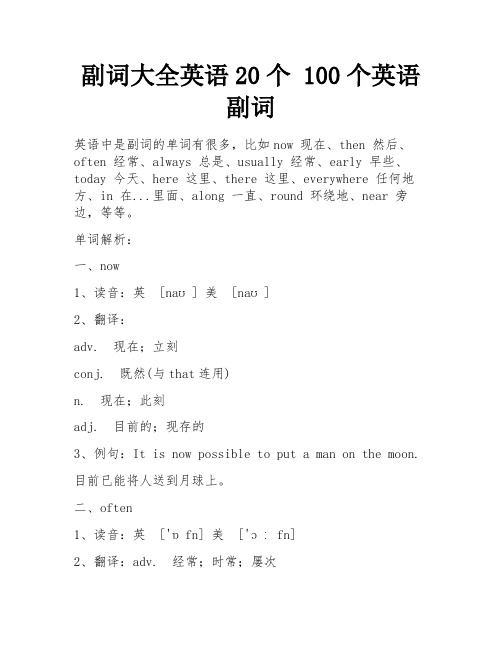
副词大全英语20个 100个英语副词英语中是副词的单词有很多,比如now 现在、then 然后、often 经常、always 总是、usually 经常、early 早些、today 今天、here 这里、there 这里、everywhere 任何地方、in 在...里面、along 一直、round 环绕地、near 旁边,等等。
单词解析:一、now1、读音:英[naʊ] 美[naʊ]2、翻译:adv. 现在;立刻conj. 既然(与that连用)n. 现在;此刻adj. 目前的;现存的3、例句:It is now possible to put a man on the moon.目前已能将人送到月球上。
二、often1、读音:英['ɒfn] 美['ɔːfn]2、翻译:adv. 经常;时常;屡次3、例句:I often take my children to play in the park.我经常带我的孩子们去公园玩。
三、always1、读音:英['ɔːlweɪz] 美['ɔːlweɪz]2、翻译:adv. 总是;一直;始终;永远;随时;无论如何3、例句:I'm always at home in the evenings.晚上我总是在家里。
四、here1、读音:英[hɪə(r)] 美[hɪr]2、翻译:adv. 这里;这时;在这点上n. 这里int. 嘿;喂(用于引起注意)3、例句:It is neither hot nor cold in winter here.这里冬天既不热也不冷。
五、today1、读音:英[tə'deɪ] 美[tə'deɪ]2、翻译:n. 今天;当今adv. 今天;当今adj. 现在的3、例句:I feel my fingers are all thumbs today.我觉得我今天笨手笨脚。
英语十大副词介绍
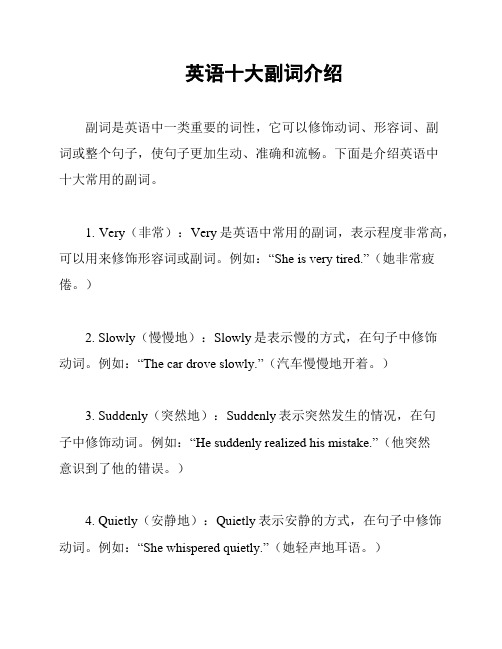
英语十大副词介绍副词是英语中一类重要的词性,它可以修饰动词、形容词、副词或整个句子,使句子更加生动、准确和流畅。
下面是介绍英语中十大常用的副词。
1. Very(非常):Very是英语中常用的副词,表示程度非常高,可以用来修饰形容词或副词。
例如:“She is very tired.”(她非常疲倦。
)2. Slowly(慢慢地):Slowly是表示慢的方式,在句子中修饰动词。
例如:“The car drove slowly.”(汽车慢慢地开着。
)3. Suddenly(突然地):Suddenly表示突然发生的情况,在句子中修饰动词。
例如:“He suddenly realized his mistake.”(他突然意识到了他的错误。
)4. Quietly(安静地):Quietly表示安静的方式,在句子中修饰动词。
例如:“She whispered quietly.”(她轻声地耳语。
)5. Clearly(清晰地):Clearly表示明确的方式,在句子中修饰动词或形容词。
例如:“He spoke clearly.”(他说话清晰明了。
)6. Really(真正地):Really表示真正的方式或程度,在句子中修饰形容词或副词。
例如:“I'm really tired.”(我真的很累。
)8. Carefully(小心地):Carefully表示小心的方式,在句子中修饰动词。
例如:“She handled the fragile vase carefully.”(她小心地处理着易碎的花瓶。
)9. Happily(快乐地):Happily表示快乐的方式,在句子中修饰动词。
例如:“They danced happily all night.”(他们快乐地跳了一整晚。
)10. Hardly(几乎不):Hardly表示几乎不的程度,在句子中修饰动词。
例如:“He hardly ever goes out.”(他几乎从不出门。
副词大全副词英语词汇全解析
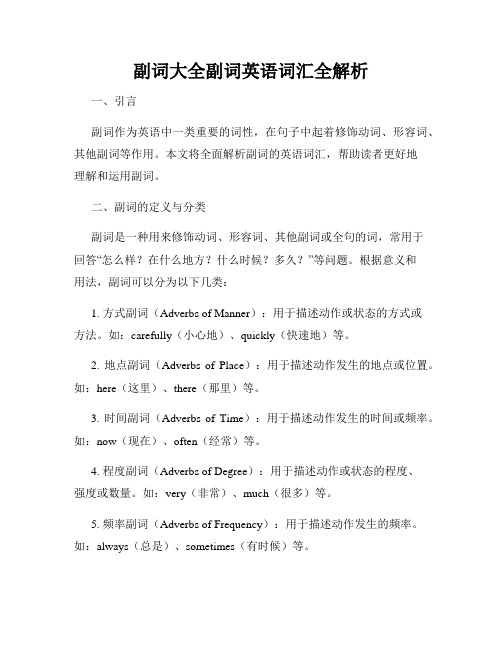
副词大全副词英语词汇全解析一、引言副词作为英语中一类重要的词性,在句子中起着修饰动词、形容词、其他副词等作用。
本文将全面解析副词的英语词汇,帮助读者更好地理解和运用副词。
二、副词的定义与分类副词是一种用来修饰动词、形容词、其他副词或全句的词,常用于回答“怎么样?在什么地方?什么时候?多久?”等问题。
根据意义和用法,副词可以分为以下几类:1. 方式副词(Adverbs of Manner):用于描述动作或状态的方式或方法。
如:carefully(小心地)、quickly(快速地)等。
2. 地点副词(Adverbs of Place):用于描述动作发生的地点或位置。
如:here(这里)、there(那里)等。
3. 时间副词(Adverbs of Time):用于描述动作发生的时间或频率。
如:now(现在)、often(经常)等。
4. 程度副词(Adverbs of Degree):用于描述动作或状态的程度、强度或数量。
如:very(非常)、much(很多)等。
5. 频率副词(Adverbs of Frequency):用于描述动作发生的频率。
如:always(总是)、sometimes(有时候)等。
6. 疑问副词(Interrogative Adverbs):用于引导疑问句,询问方式、地点、时间等。
如:how(如何)、where(哪里)等。
7. 关系副词(Relative Adverbs):用于引导关系从句,表示地点、时间或原因。
如:where(在哪里)、when(在什么时候)等。
三、副词的用法与例句以下是常见副词的用法和例句,供读者参考:1. 方式副词- Carefully(小心地):She carefully opened the box.(她小心地打开了盒子。
)- Quietly(安静地):The children played quietly in the park.(孩子们在公园里安静地玩耍。
英语十大副词介绍
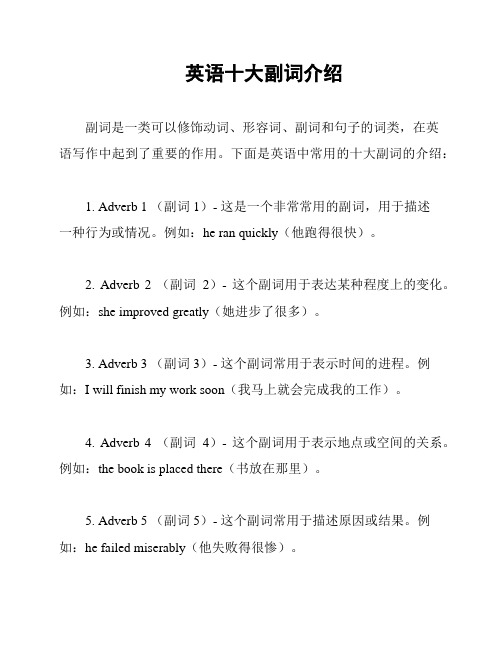
英语十大副词介绍副词是一类可以修饰动词、形容词、副词和句子的词类,在英语写作中起到了重要的作用。
下面是英语中常用的十大副词的介绍:1. Adverb 1 (副词1)- 这是一个非常常用的副词,用于描述一种行为或情况。
例如:he ran quickly(他跑得很快)。
2. Adverb 2 (副词2)- 这个副词用于表达某种程度上的变化。
例如:she improved greatly(她进步了很多)。
3. Adverb 3 (副词3)- 这个副词常用于表示时间的进程。
例如:I will finish my work soon(我马上就会完成我的工作)。
4. Adverb 4 (副词4)- 这个副词用于表示地点或空间的关系。
例如:the book is placed there(书放在那里)。
5. Adverb 5 (副词5)- 这个副词常用于描述原因或结果。
例如:he failed miserably(他失败得很惨)。
6. Adverb 6 (副词6)- 这个副词用于表示方式或方式。
例如:she sings beautifully(她唱得很好听)。
7. Adverb 7 (副词7)- 这个副词常用于描述程度或数量。
例如:he ate too much(他吃得太多了)。
8. Adverb 8 (副词8)- 这个副词用于表示感情或态度。
例如:she smiled happily(她开心地微笑)。
9. Adverb 9 (副词9)- 这个副词常用于表示目的或目标。
例如:he went there to learn(他去那里研究)。
10. Adverb 10 (副词10)- 这个副词用于表示顺序或步骤。
例如:first, he did this; then, he did that(他首先做了这个,然后又做了那个)。
以上是十大常用的英语副词介绍,希望对您的学习有所帮助。
记住在写作中灵活使用副词,能够让句子更加准确有力。
- 1、下载文档前请自行甄别文档内容的完整性,平台不提供额外的编辑、内容补充、找答案等附加服务。
- 2、"仅部分预览"的文档,不可在线预览部分如存在完整性等问题,可反馈申请退款(可完整预览的文档不适用该条件!)。
- 3、如文档侵犯您的权益,请联系客服反馈,我们会尽快为您处理(人工客服工作时间:9:00-18:30)。
副词的定义:之袁州冬雪创作
副词是一种用来修饰动词,形容词,副词或全句的词,说
明时间,地点,程度,方式等概念.
副词的分类:
1) 时间和频度副词:
now,then,often,always,usually,early,today, lately, next,last,already,generally,frequently,
seldom,ever,never,yet,soon,too, immediately,
hardly,finally,shortly, before, ago,sometimes, yesterday. 2) 地点副词: here, there, everywhere, anywhere, in, out, inside, outside, above, below, down, back, forward, home, upstairs, downstairs, across, along, round , around, near, off, past, up, away, on.
3) 方式副词: carefully, properly, anxiously, suddenly, normally, fast, well, calmly, politely, proudly, softly, warmly 4) 程度副词: much,little,
very,rather,so,too,still, quite, perfectly, enough, extremely, entirely,almost, slightly. 5) 疑问副词: how, when, where, why. 6) 关系副词: when, where, why.
7) 毗连副词: how, when, where, why, whether.
副词的用法:
副词在句中可作状语,表语,短语.He works hard.
他工作尽力.You speak English quite well. 你英语
讲的很好.Is she in ? 她在家吗? Let's be out.
让我们出去吧.Food here is hard to get. 这儿很难
弄到食物.
副词的位置:
1) 多数副词都可以放在动词的后面,如果动词带有宾语,副
词就放在宾语后面.I get up early in the morning everyday. 我天天早早起床.He gave me a gift yesterday. 他昨
天给了我一件礼品.She didn't drink water enough.
她没喝够水.The train goes fast. 火车跑得快.We can go to this school freely. 我们可以收费到这家学校
学习.They left a life hardly then. 当时他们的生
活很艰难.He has a new cat on today. 他明天戴了一
顶新帽子.I have seen this film twice with my friends. 这部电影我和朋友看过两次.2) 副词修饰形容词,副词时,
副词在前面,而被修饰的词在后面.It's rather easy, I can do it. 这很容易,我能做到.He did it quite well.
他做得相当好.It's rather difficult to tell who is right. 很难说谁是对的.It's so important that I must tell my
friends. 这件事太重要了,我得告诉我的朋友.It's much better. 好多了.3) 频度副词可放在实义动词的前面,情态动词和助动词的后面.I often help him these days. 这些日子我常常帮忙他.I always remember the day when I first came to this school. 我常常记得我第一次来学校的那一天.You mustn't always help me. 你不克不及总是帮忙我.He seldom comes to see us. 他很少来看我们.We usually go shopping once a week.
我们通常一周买一次东西.The new students don't always go to dance. 新学生其实不时常去跳舞.4) 疑问副词,毗连副词,关系副词以及修饰整个句子的副词,通常放在句
子或从句的前面.When do you study everyday? 你天天什么时间学习? Can you tell me how you did it? 你能告诉我你如何做的吗? First, let me ask you some questions. 先让我来问几个问题.How much does this bike cost? 这辆车子多少钱?Either you go or he comes. 不是你去就是他来.The students were reading when the teacher came into the classroom. 当教师进教室时,学生们正在读书.5) 时间副词和地点副词在一个句中, 地点副词在前面时间副词在后面.We went shopping in the supermarket at 9 o'clock yesterday. 昨天九点钟我们到超市买东西了. What were you doing in the
classroom yesterday evening? 昨天下午你在教室里
干什么?The accident took place one hour ago in the Eleven Avenue. 一小时前十一号大街发生了一场事故.副词的比较等级:
副词和形容词一样,也有它的比较级和最高级形式. 可
以参考形容词的变换形式.但以词尾 -ly 开头的副词(除early )须用 more 和 most .hard harder hardest fast faster fastest early earlier earliest much more most warmly more warmly most warmly 单音节副词的比较
级是在副词后面加上 -er 构成的,最高级是在副词后面加
上 -est 构成的.near nearer nearest hard harder hardest 多音节副词的比较级是在副词的前面加上 -more 构成的.
最高级是在副词前面加上 -most 构成的.warmlymore warmlymost warmly successfullymore successfullymost successfully 有些副词的比较级和最高级形式是不规
则的.well-better - best little - less - least Much- more - most badly - worse - worst
far-farther(further)-farthest(furthest) 副词的比较
级和最高级用法同形容词的比较级用法基本一样.最高级形
式句中 the 可以省略.He works harder than I. 他比我工作尽力.Lucy gets up earlier than Lili. 露西
比丽丽起床早.He runs fastest in our class. 他在我们班跑地最快.He dives deeper than his teammates. 他比他的队员潜水深.It's true that he speak English more fluently than any of us. 他英语讲的确实比我们任何人都好.Our school team play football best in our region. 我们校队在我们地区足球踢得最好的.。
